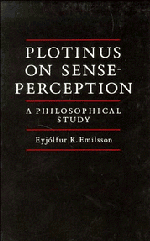Book contents
- Frontmatter
- Contents
- Acknowledgements
- Introduction
- I Plotinus' metaphysics
- II Plotinus' views on the soul and man
- III The relation between the eye and the object of vision
- IV Sensory affection
- V The unity of the senses
- VI The objects of perception
- VII Perceptions as acts and forms in perception
- VIII Conclusions
- Abbreviations
- Notes
- Bibliography
- Index
IV - Sensory affection
Published online by Cambridge University Press: 07 May 2010
- Frontmatter
- Contents
- Acknowledgements
- Introduction
- I Plotinus' metaphysics
- II Plotinus' views on the soul and man
- III The relation between the eye and the object of vision
- IV Sensory affection
- V The unity of the senses
- VI The objects of perception
- VII Perceptions as acts and forms in perception
- VIII Conclusions
- Abbreviations
- Notes
- Bibliography
- Index
Summary
In the previous chapter we saw, in connection with Plotinus’ sympatheia theory, that vision involves the affection of the eye by the object of vision. It is Plotinus’ view that such affection of the sense-organs occurs in sense-perception quite generally. In the present chapter I consider the nature of this affection. In the first section I briefly discuss Plotinus’ word for affection, pathos, and its appearance in earlier Greek theories of perception. In the second section I consider the passages in the Enneads that are most informative concerning the nature and role of affection in Plotinus’ theory. This enterprise will reveal significant points about Plotinus’ views on sensory affection, points which, however, are subject to radically different interpretations. In the third section I consider in detail one such interpretation, or rather one family of interpretations that share an important common element. I will show that this type of interpretation, in which sensory affections are regarded as physical changes in the sense-organs, runs into serious difficulties when confronted with other aspects of Plotinus’ views on perception. In the fourth and last section, I propose a different line of interpretation which seems to me to conform better to the textual evidence, when everything is considered.
Throughout this chapter, the focus is on sensory affection in vision. The reason for this emphasis is that Plotinus himself, like most philosophers of perception, focuses on vision: it is evident that when he talks about sense-perception generally, without specifying a particular s'ense, vision is as a rule the case that he is thinking of, though he evidently thinks of his theory as applying to the other senses as well.
- Type
- Chapter
- Information
- Plotinus on Sense-PerceptionA Philosophical Study, pp. 63 - 93Publisher: Cambridge University PressPrint publication year: 1988



